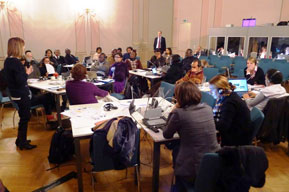7 March 2011, by Phoebe Hardefeldt.
The first civil society training on the UNCAC review mechanism was held in Austria from 2-4 February 2011. It was organised in partnership by the UNODC and Transparency International (TI), in its capacity as Secretariat to the UNCAC Coalition, with support from the UK Department for International Development.

With the first year UNCAC reviews currently under way and the second year reviews starting around June, the training was an important step in strengthening civil society’s capacity to play an active role in the review process, including through dialogue with states parties. This is particularly important because the UNCAC is the first global legal binding instrument that devotes an entire article to civil society participation (Article 13). 35 representatives from CSOs came together for the training in the new International Anti-Corruption Academy (IACA) in Austria. The representatives came from countries under review during the first and second years of the review process, as well as regional representatives from the Middle East and Latin America, and a representative from the NGO Alliance on Crime Prevention and Criminal Justice.

The first two days of the was run by the UNODC and training covered the schedule and methodology of the review process, as well as giving participants practical experience using review tools and analysing the implementation of selected UNCAC articles. Participants had the chance to test the government self-assessment software, and to participate in a simultion of a country visit. The third day was ru by Transparency International, and focused how civil society can participate effectively in the review process. This included sessions on accessing government information relating to UNCAC implementation and the review process and preparing a civil society report, key entry points for civil society input into the reviews, and how to engage in advocacy on the review process.
CSO representatives gained a strong understanding of the UNCAC review process, providing the basis for their participation in and advocacy on the review process at national and international levels. Participants will now share their learnings on a national level with follow-up activities in their own countries. Check out stories from the training on the UNODC website.



